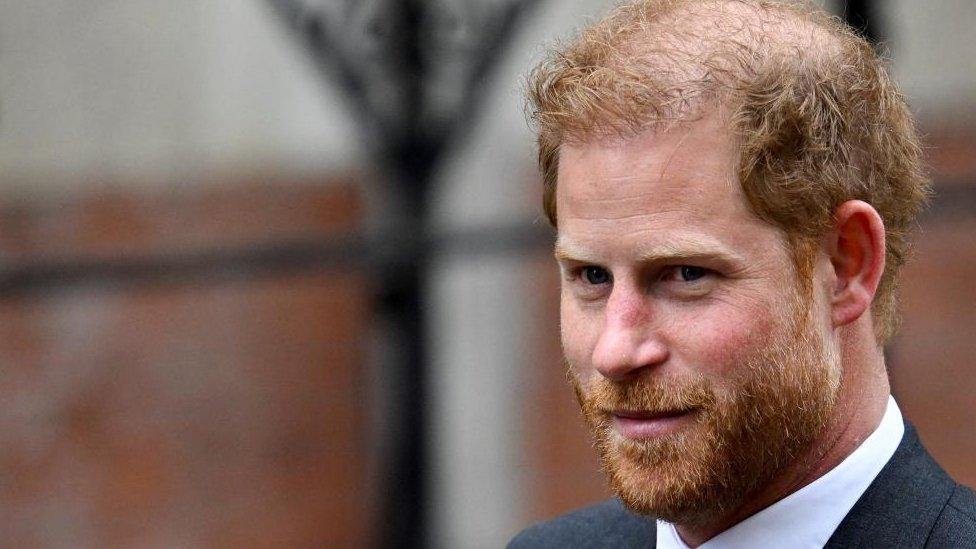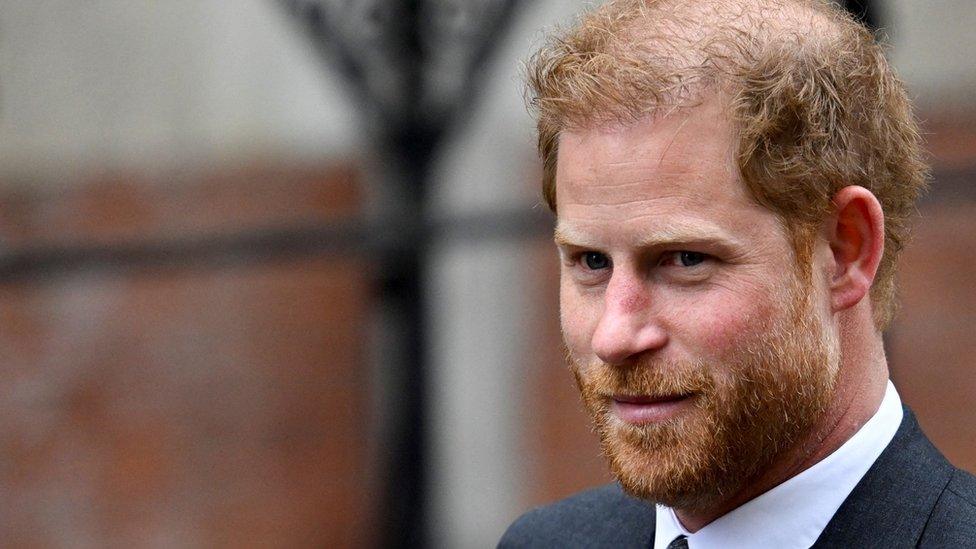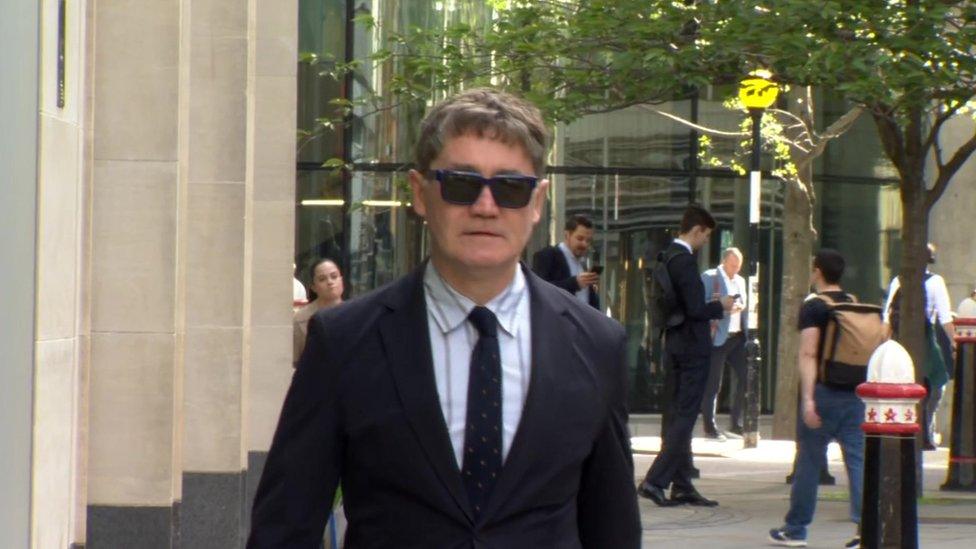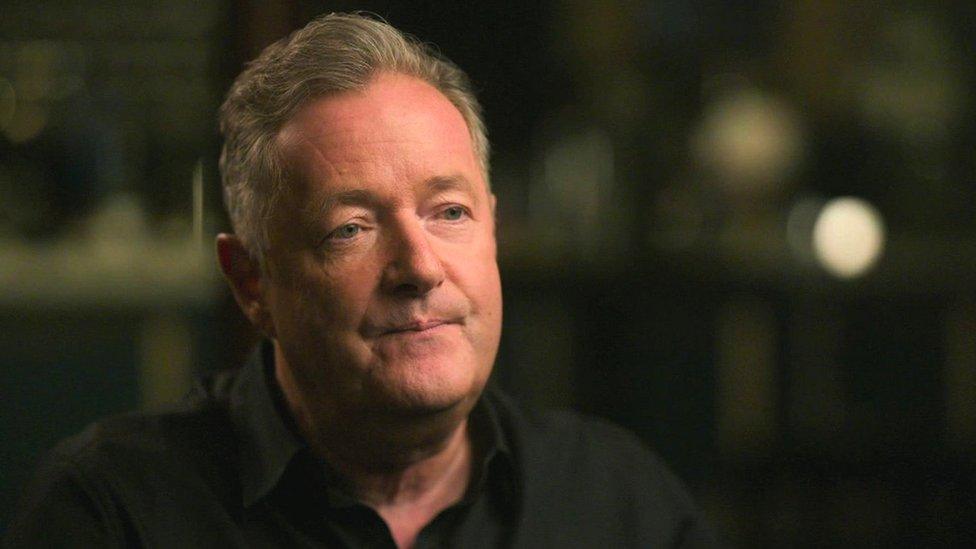Daily Mirror 'paid private investigator without checks', court hears
- Published

Prince Harry is one of the claimants in the case
A Daily Mirror news editor waved through payments to private investigators without being sure they used lawful methods, a court has heard.
Anthony Harwood told the High Court trial examining Prince Harry's privacy claims that he had no reason to believe they were breaking the law.
He was shown several payments he authorised to an investigator who stole documents from celebrities' rubbish.
Mirror Group Newspapers (MGN) are contesting the claims against them.
During about three hours of questioning, Mr Harwood was shown dozens of emails and invoices suggesting payments by the Mirror to a range of private investigators in the UK and US.
These suggested investigators were accessing ex-directory phone numbers, social security details, and financial records, as well as deploying other methods to obtain information.
Barrister David Sherborne, who is representing the claimants in the case, said often the phrase "special investigation" was used, which he said indicated unlawful information gathering, but Mr Harwood said the paper was paying for information which could be obtained legitimately.
Mr Harwood was questioned about his ties with Benjamin Pell, a freelancer who once specialised in rummaging through the bins of well-known people for information about them.
He agreed Pell was "notorious" for working for other newspapers, including the now-defunct News of the World, but said he had no direct dealings with him personally.
Mr Sherborne presented Mr Harwood with invoices worth hundreds of pounds paid by the Daily Mirror to Pell.
These included sums for stories about David Beckham, the band All Saints, and the then director-general of the BBC, John Birt - and had been signed off by Mr Harwood.
The former news editor said he was "just there to tick off" the payments. Asked if he was "just waving through payments", he said "yes", adding: "You wouldn't have time to open each one. It was a tick box system."
He referred to the pressure of "getting things into the paper", saying "anything up to £400 I'd probably tick".
Mr Sherborne asked if it was Mr Harwood's responsibility to ensure that journalists and the work they carried out was lawful.
He said he assumed that it was and he "had no reason to believe" they were breaking the law.
Mirror Group Newspapers admits illegal methods were used to gather some stories but denies senior editors knew, and disagrees that wrong-doing was widespread.
More than 100 alleged victims say their information was unlawfully obtained by Mirror newspapers through phone hacking and so-called blagging. Four cases, including that of Prince Harry, are being considered in the current trial.
Mr Harwood's byline appeared on a contested 2004 article by the Daily Mirror which revealed the identity of Chelsy Davy, Prince Harry's then girlfriend who was referred to as a "mystery blonde" at the time.
The claimants say the story was obtained through unlawful methods.
Mr Harwood said the identity was first reported by the Daily Mail and he was confident the Mirror's version of the story was obtained legitimately.
Mr Harwood worked as a desk editor between 1995 and 2003, before moving to New York as the paper's editor in the US. He returned to the UK in 2005, becoming head of news.
He was called as a witness because he is now working freelance providing "journalistic support" to lawyers for Mirror Group Newspapers which is defending itself against privacy claims.
Mr Harwood told the court: "In my experience, phone hacking was not habitual or rife on the Mirror news desk - I was not aware of anyone in my department who hacked phones. We just didn't do that."
He said there was nothing untoward about the number of celebrity phone numbers he had in his possession, arguing it was necessary for a news editor to hold them in case they needed to be reached urgently to reply to a story.
Mr Harwood said the numbers were not used for hacking or any other unlawful method.
In earlier evidence a technical manager at Mirror Group Newspapers, Peter Raettig, was questioned about why back-ups of the email accounts of key executives in the early 2000s were largely empty.
He said users were encouraged to delete old emails to reduce the amount of data held by the system.
Mirror Group Newspapers provided a snapshot of its email data in 2011 to the Leveson Inquiry into press standards.
Correction 20 May: this story has been updated after an earlier version incorrectly stated how long Mr Harwood was in the witness box.
Related topics
- Published11 May 2023

- Published17 May 2023

- Published10 May 2023
